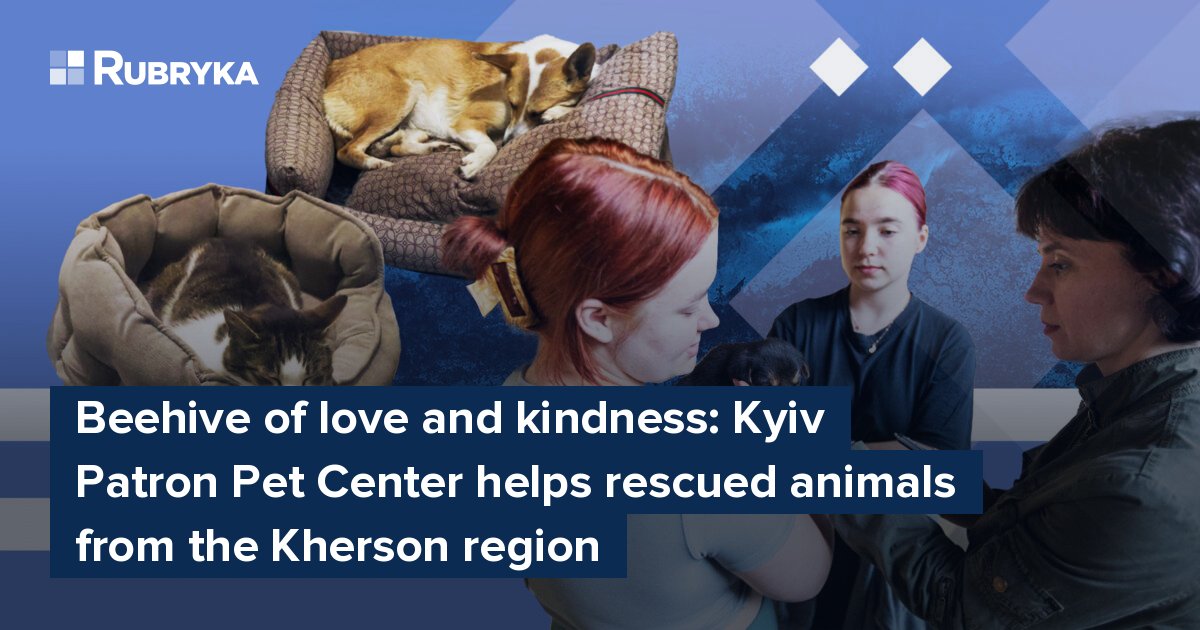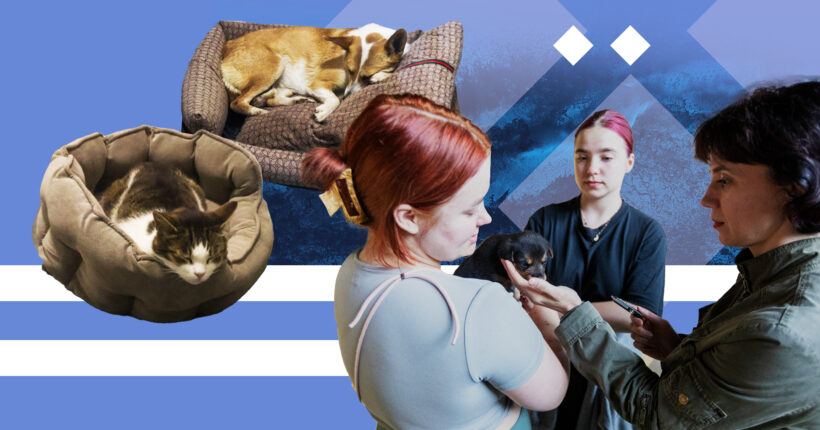
What is the problem?
On the night of June 6, the Russians blew up the Kakhovska hydroelectric power plant in Ukraine's Kherson region, and its destruction led to a large-scale flood. Thousands of people and animals were trapped in the water.
Volunteers and employees of special services en masse began rescuing injured people and animals. Rescued cats and dogs are taken to Mykolaiv, Kropyvnytskyi, Poltava, Cherkasy, Kharkiv, Chernihiv, Kyiv, and other cities, but even there, in relevant safety, they need help and care.
What is the solution?
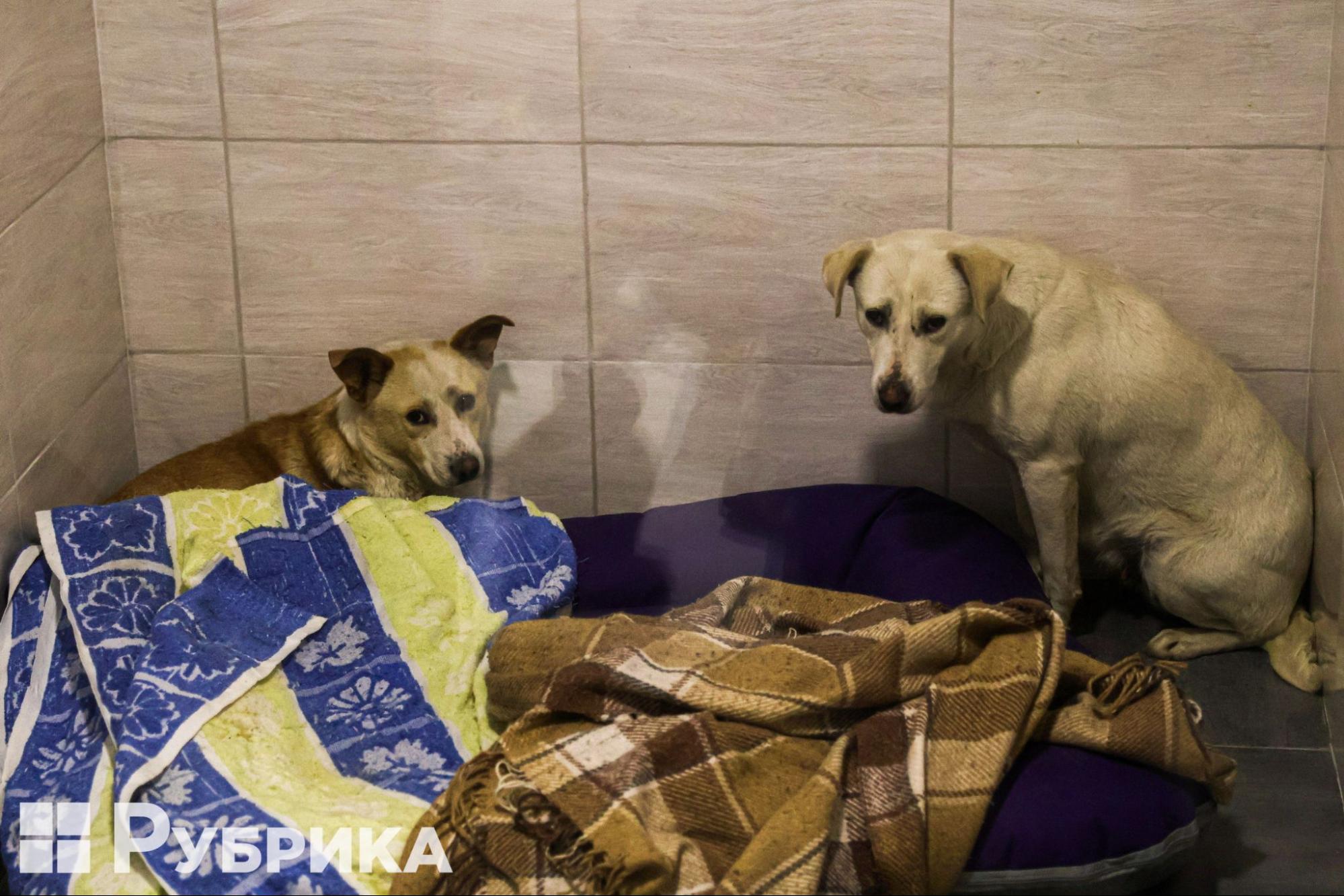
Patron Pet Center has become a hub for rescued animals, and there are already almost 80 wards
Patron Pet Center was one of the first in Kyiv to accept animals rescued from the flood in the Kherson region. The Adoption Center, located in Pavilion 11 of the National Complex Expocenter of Ukraine (VDNG), was opened a month before the scheduled date to accommodate the animals. Currently, there are approximately 80 wards here, but more will come. Rubryka visited the center to learn how animals are doing and how they can be helped.
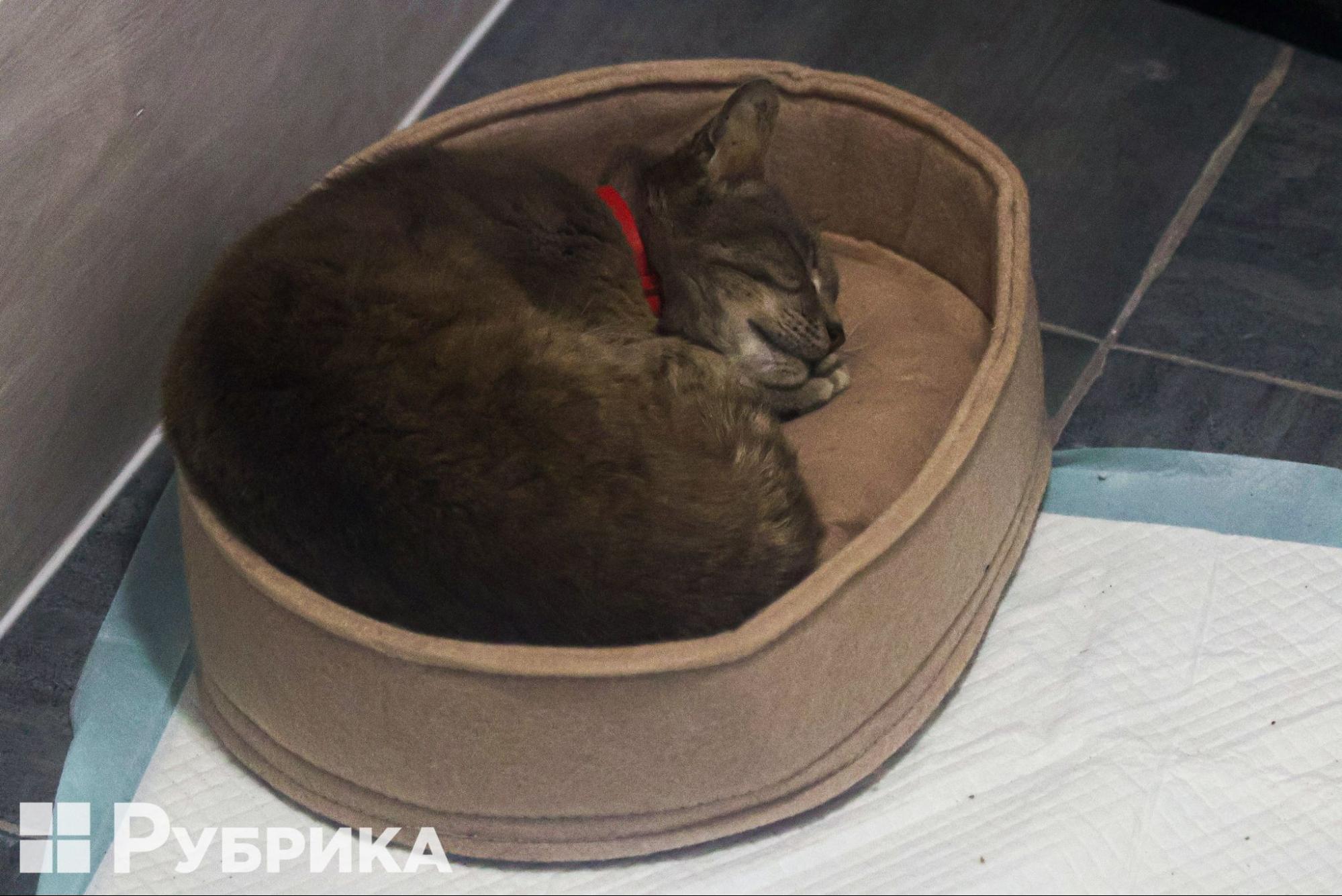
Due to the explosion of the Kakhovka HPP, the Patron Pet Center opened almost a month earlier than the planned date, but they are already trying to provide comfort for all wards
How does it work?
Iryna Podvoyska, the manager of Patron Pet Center, talks to us, simultaneously answering a number of urgent questions.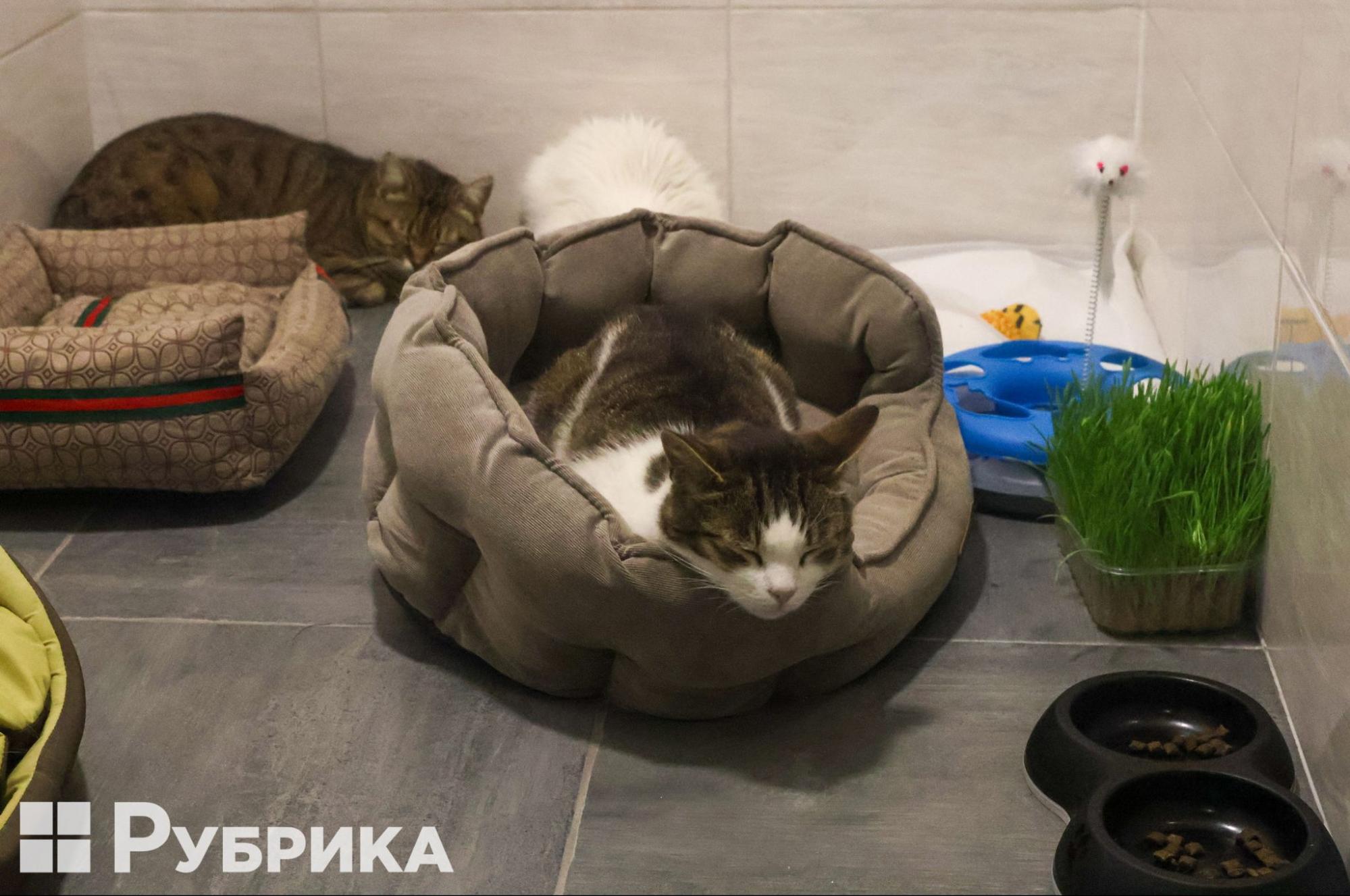 Cats in enclosures with airtight doors, where they can't hear dogs barking, rehabilitate much faster
Cats in enclosures with airtight doors, where they can't hear dogs barking, rehabilitate much faster
The spacious 11th pavilion of VDNG is divided by rows of hastily made but neat enclosures. The doors are all closed and even sealed for cats, so they do not hear the dog neighbors — most sleep peacefully on comfortable bedding. Some dogs and cats can be seen through the glass, and the doors to others are closed because the animals get scared of the appearance of people. There is howling here and there because the dogs are stressed, and many are not used to being in the enclosure. Animals in the most difficult condition lie in cages, they are aggressive because of what they have experienced, and it is still difficult to approach them.
No less than a third of the free space in the pavilion is occupied by boxes and bags with various feeds and fillers for toilets, diapers, and other hygiene products.
Patron Pet Adoption Center was founded by entrepreneurs Andrii Stavnitser and Rostyslav Vovk. Currently, both of them are engaged in charity and social initiatives. They planned to open in late June, but on the morning of June 6, when everyone learned about the explosion of the Kakhovka HPP, they decided it was time to open.
"We are glad that we can be useful," says Podvoyska.
Currently, animals from military personnel and volunteers from the Kherson region are accepted there. Animals from other areas with ongoing hostilities will also be accepted when the situation improves. Due to an urgent need, the center opened without operations and is currently staffed by volunteers.
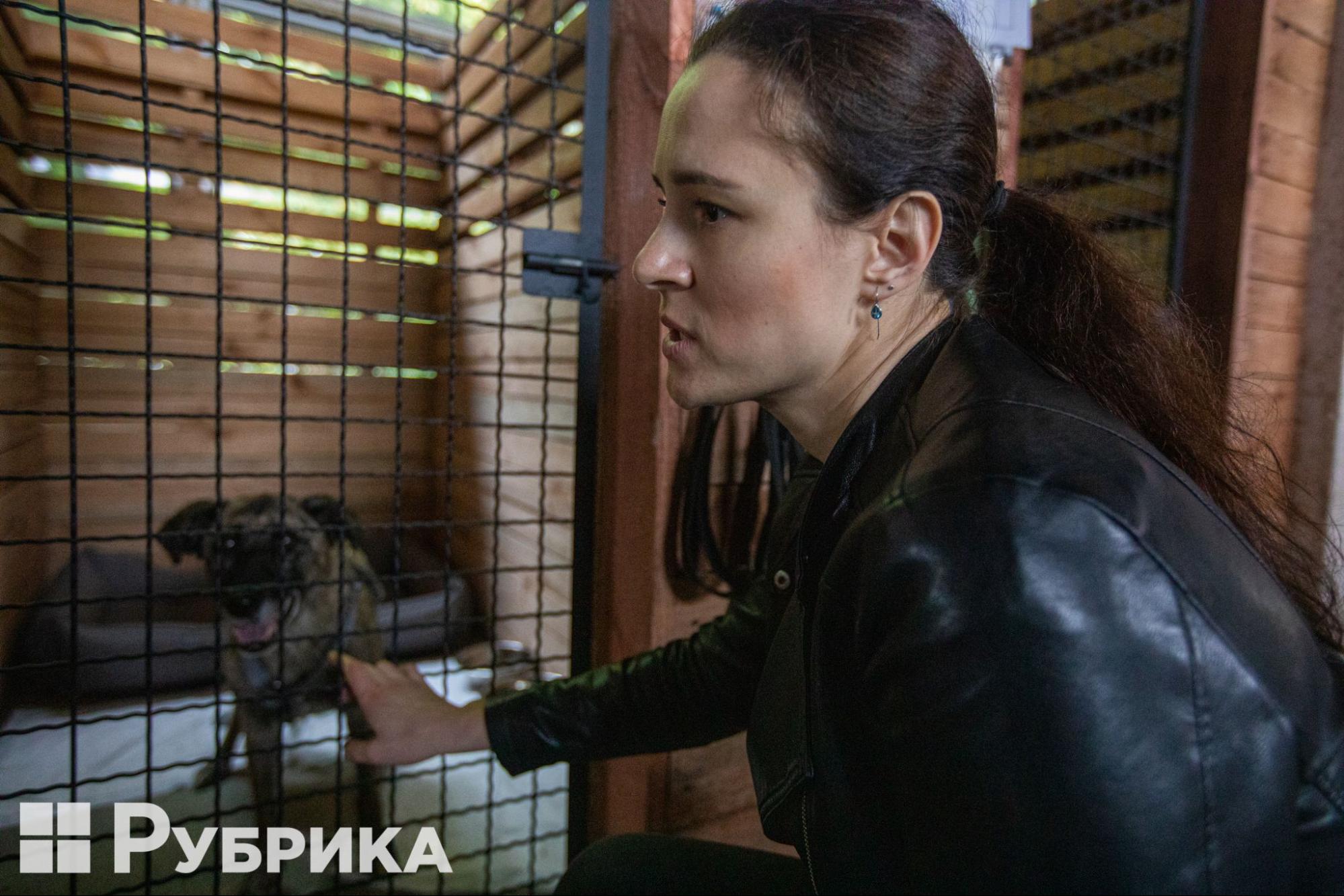
Volunteer Iryna Pyatanchuk brought humanitarian aid, stayed until the evening — and went home for five days only to spend the night
Iryna Pyatanchuk is one of these volunteers. She came immediately when she found out that rescued animals are accepted here. She brought humanitarian aid and stayed until the evening — and for five days, she only goes home to spend the night. Most volunteers here do the same.
In search of families — old and new
"A lot of people from Kherson are now looking for their pets. Four animals from our center have already found their previous owners," says Iryna Podvoyska, Patron Pet Center manager, about the wards' placement. "It is heartwarming that Ukrainians are so responsive and responsible. They are looking for their pets because they were forced to separate due to the flood. We do not condemn them, and we understand the situation."
First, the center looks for previous families, and if the family can't take the animal, only then does the center look for another owner. All animals are already photographed and can be found on the center's Instagram page.
Animals in the center are quarantined. They are examined, treated for parasites, and vaccinated and sterilized if the state of health allows. The Association of Veterinary Doctors of Ukraine, as well as the willingness of many veterinarians and other specialists to help animals free of charge, help with that.
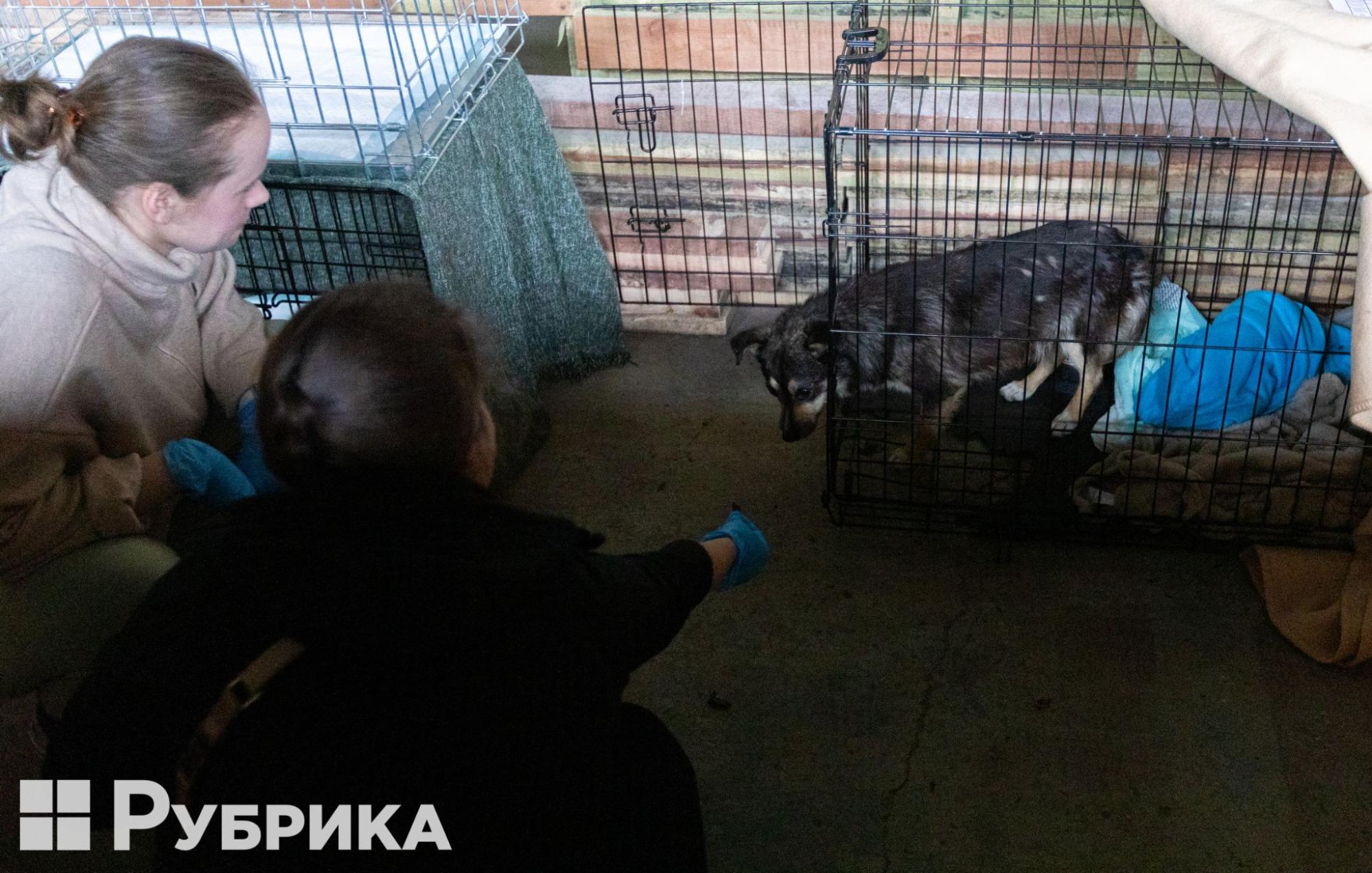
Veterinarians lure a dog out of its cage to treat it for ticks
Many people come to the center as volunteers — veterinarians, groomers, and dog trainers and offer their help, says Pyatanchuk. She does not hold back her emotions: "Wow, finally, our society in Ukraine woke up and became responsible, and we are such a powerful force!" Indeed, five days ago, the center had nothing but walls, but now there are food, medicine, collars, and sleeping bags. The animals are fed, clean, and tidy. "Ukrainians are cool people. We just unite and do it," Pyatanchuk proudly says.
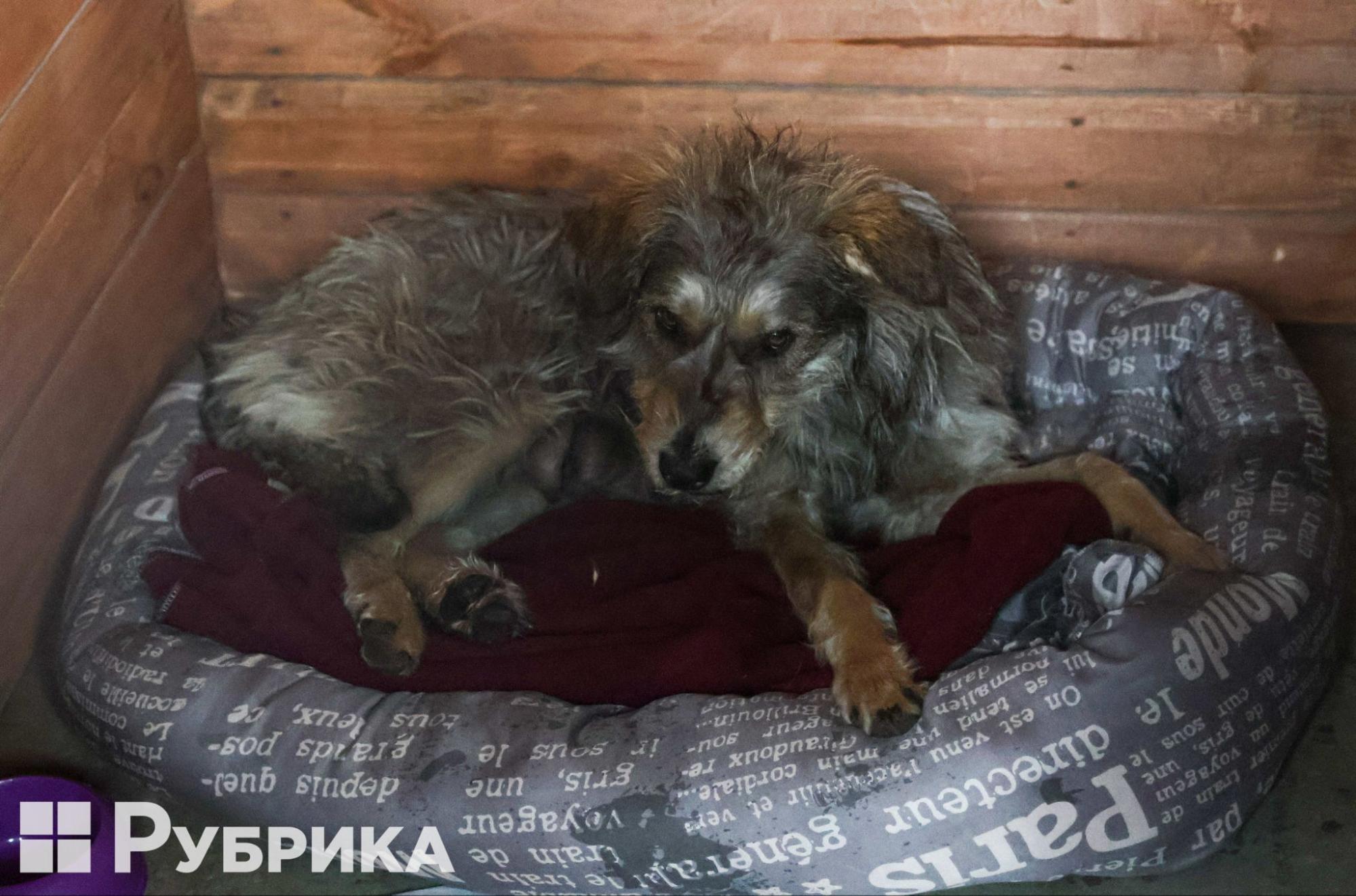
A dog lying comfortably in the center's shelter
The volunteer hopes that some of the animals will be found by their families. After all, you can see that they were pets and lived at home — animals are very stressed and even depressed in enclosures. Pyatanchuk also told Rubryka stories of several animals who were lucky enough to fall into specialists' kind and caring hands.
Izzy
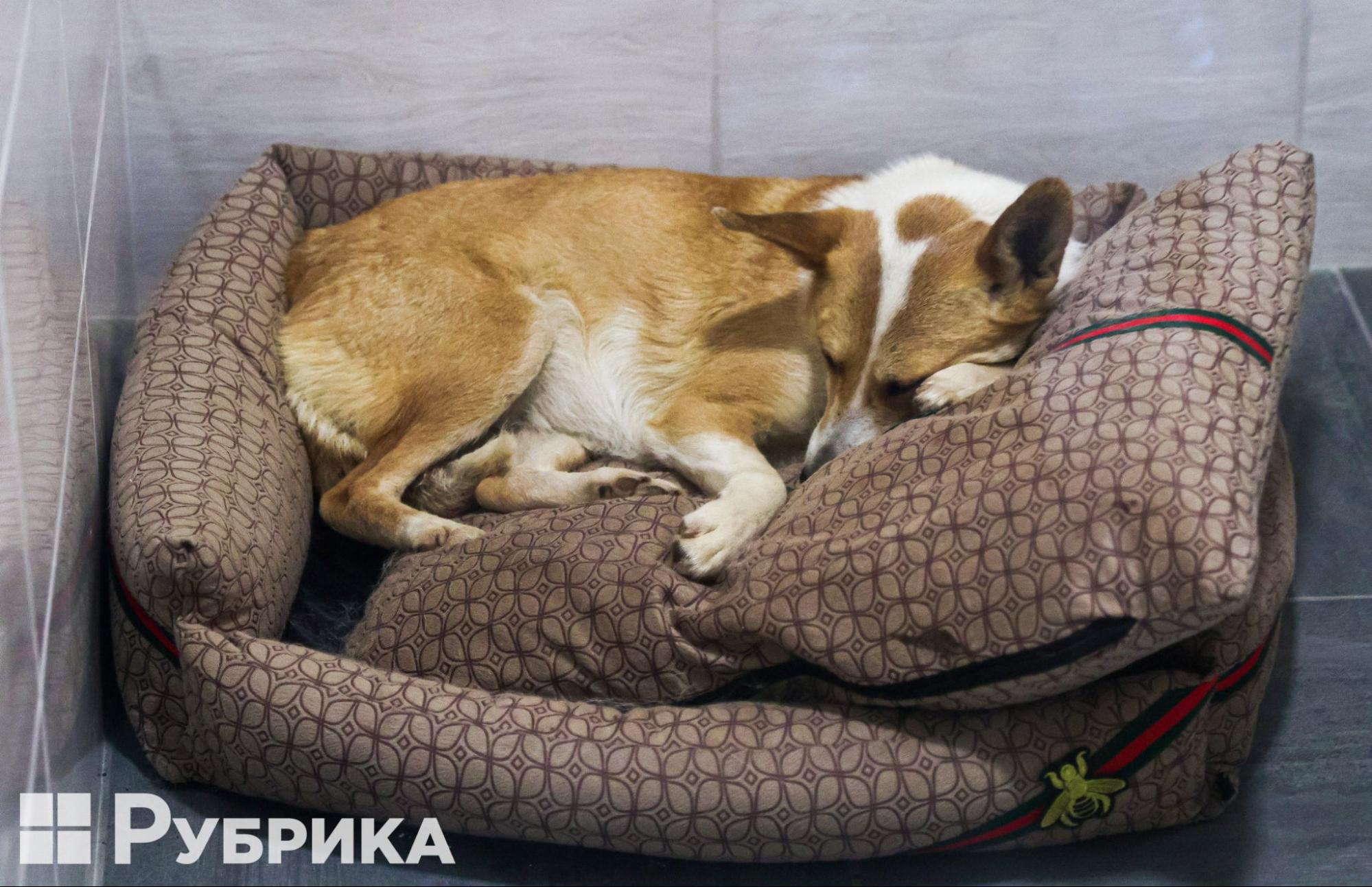
Izzy experienced severe stress but is slowly coming to her senses, calming down
"We named her Izzy and even managed to hug her yesterday," Pyatanchuk leads us to the enclosure where a short-haired, light-red dog with white spots is sleeping. Izzy is a young dog, up to 5 years old.
She arrived on the night of June 8, and on the first day, she even tried to scratch people because she was so stressed. She is still afraid of people — only a few of the volunteers can take her for a walk. "Yesterday we made progress: Izzy came up to me to be petted," the volunteer rejoices. "In fact, she has no aggression, and she just shows nervousness."
"She was brought as Vyshyvanka, but here she responds to Kvitochka"
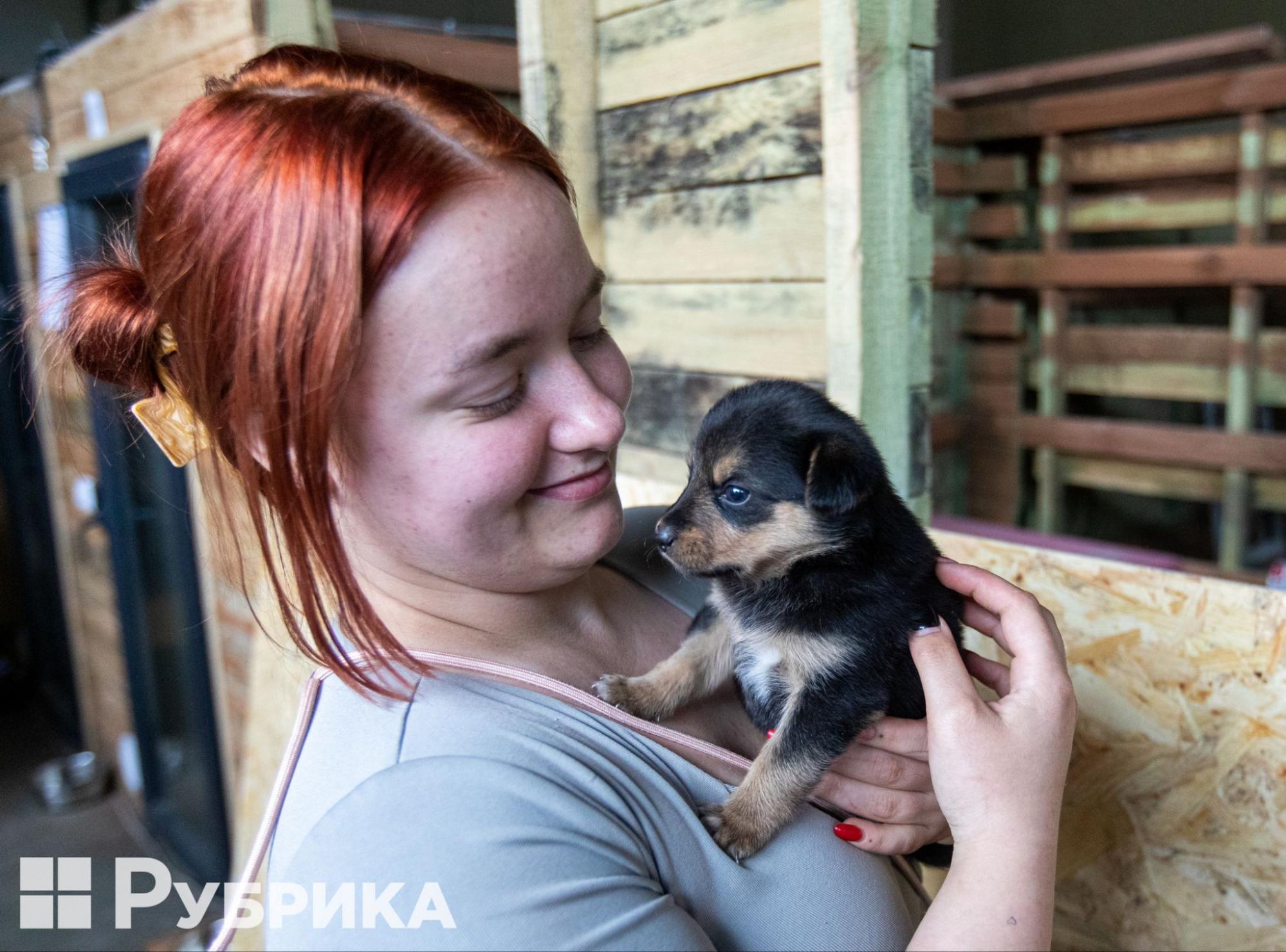
Kvitochka sitting in the arms of volunteer Anastasia Kozyreva
A very small puppy came from Kherson alone, without its mother, says Anastasia Kozyreva, who helps with animal care and sorting medicines at the center. "We initially placed her with one dog with puppies, but the main problem was that she is the smallest in our house, and all the puppies are bigger," explains Kozyreva, holding the dog in one hand.
The new mother did not accept her, so she was placed with another dog who had lost her cubs in Kherson. Before that, she had already taken in two other, bigger puppies, and these puppies were already biting the Kvitochka, driving her into a corner. That will not work either, so the center is looking for another solution.
The volunteer says that the puppy was brought as Vysyvanka, but the veterinarians noticed that it did not respond to this name, but the nickname Kvitochka suited the puppy.
"Slept, ate and accepted the puppy"
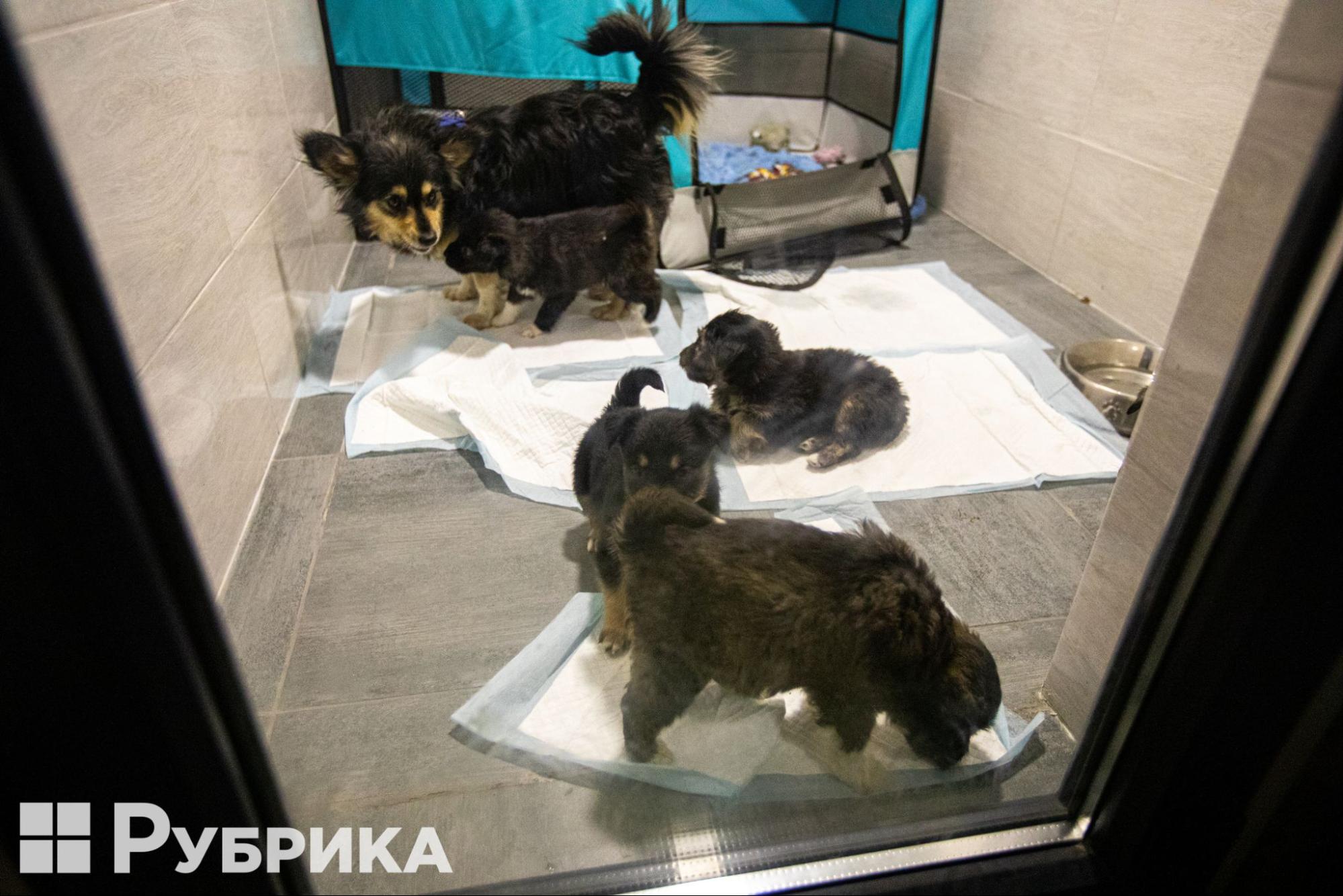
This mother has five puppies, most of which have already found future families
Pyatanchuk approaches the enclosure with a small black and gray shaggy dog and her five cubs.
"This is one family. All are healthy and already vaccinated. Let's wait for them to grow up because they still depend on their mother. We will find them a home when they are two and a half months old," says the volunteer. There are already people willing to take the puppies.
Pyatanchuk shares: they were worried that the mother would refuse to feed the children due to stress. On the first day, she even growled at the puppies. "Then she slept, ate, and the next time she took the puppies in and started feeding them," says Pyatanchuk.
The mother dog is very gentle, although she arrived in a rather neglected state at the center. Perhaps it was kept on a chain in the yard of the owners. In the center, she is given the opportunity to be alone for a certain time without puppies. "I think human mothers also understand well what it's like to be with children all the time, and there are five of them here," the volunteer smiles.
Fragile Didus' and delicate Jessie
"I fell in love with him from the first day, when he didn't let anyone near," says Pyatanchuk, who has seven animals at home, about the thin, short-haired dog, approximately 8 to 10 years old.
He has tantrums and is still quite nervous. He doesn't bite; he just starts howling and twitching. To examine him, it was necessary to give a sedative, so now Didus', which translates as grandpa in Ukrainian, as the volunteers called him, is sleeping peacefully in the enclosure.
"In reality, he is a very gentle boy, very fragile. You caress him, and he freezes and hides," says Pyatanchuk.
The dog has enough health problems: due to age, there are already missing teeth, a lump in one eye, baldness, and other skin problems.
The volunteer says that it is possible that he was chained. "We will 100% not look for Didus' past family. If there was one, we would not give him back," the volunteer insists. It is precisely because of such neglect.
Animals at a respectable age, and even sick ones, are always more difficult to accommodate, but one woman has been coming to Didus' for two days in a row. She already has two dogs. Didus' will be treated and, when he is no longer contagious, will be given to a new family.
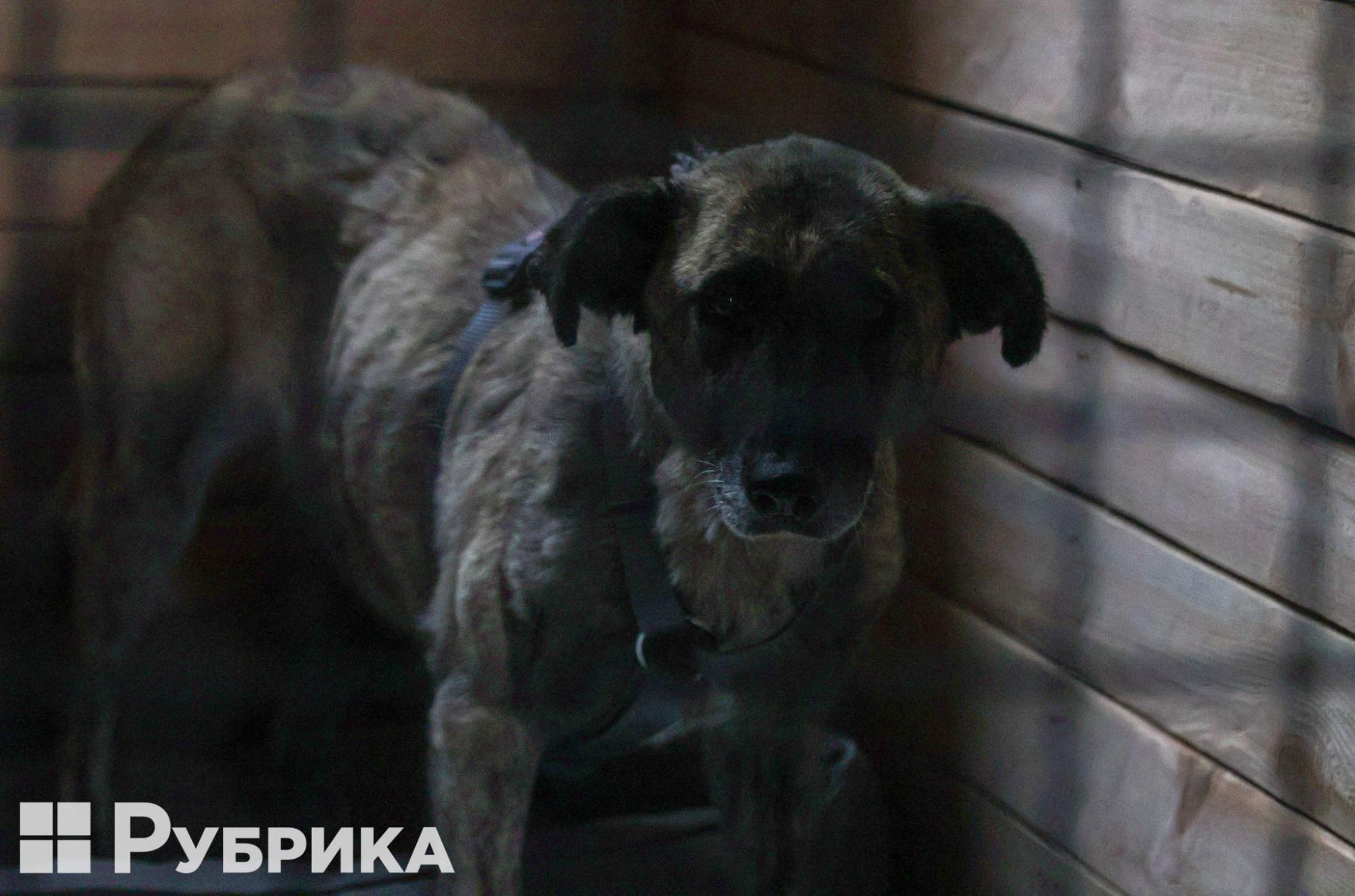
Although Jessie was domestic, she was properly taken care of only at the Adoption Center
Jessie was found alone in a locked house — thin and scared. She was also neglected: all her ears were covered in ticks.
Jessie is large but very cautious. According to Pyatanchuk, she takes food from your hands so delicately that, God forbid, she doesn't bite you. In general, she is very person-oriented. The dog has already been vaccinated and will soon be ready to go to a new family when one is found.
How it will work soon
Patron Pet Center as a space of comfort
In general, the vision of the manager of Patron Pet Center is that it should become a place where everyone feels comfortable. First, dogs and cats will have separate floors: the first is for dogs, and the second is for cats.
"I am a veterinarian, the owner of a shelter in the past. I worked specifically with adoption, so I know how to qualitatively and quickly adopt animals into a family," says Podvoyska.
The center aims to become a point of contact for Europeans who want to be useful for Ukraine. "Not all European families want to donate to the army. I don't justify it, but I know how it is possible to support our people differently, to make it easier for us," the head of the center shares.
Many people remain in the war zone because they cannot go for evacuation because they have animals. Someone has many dogs or just a big dog, and someone has a lot of cats. Because of this, they do not leave the territory, and they remain under enemy fire. The center sees a way out of the situation in animal adoption.
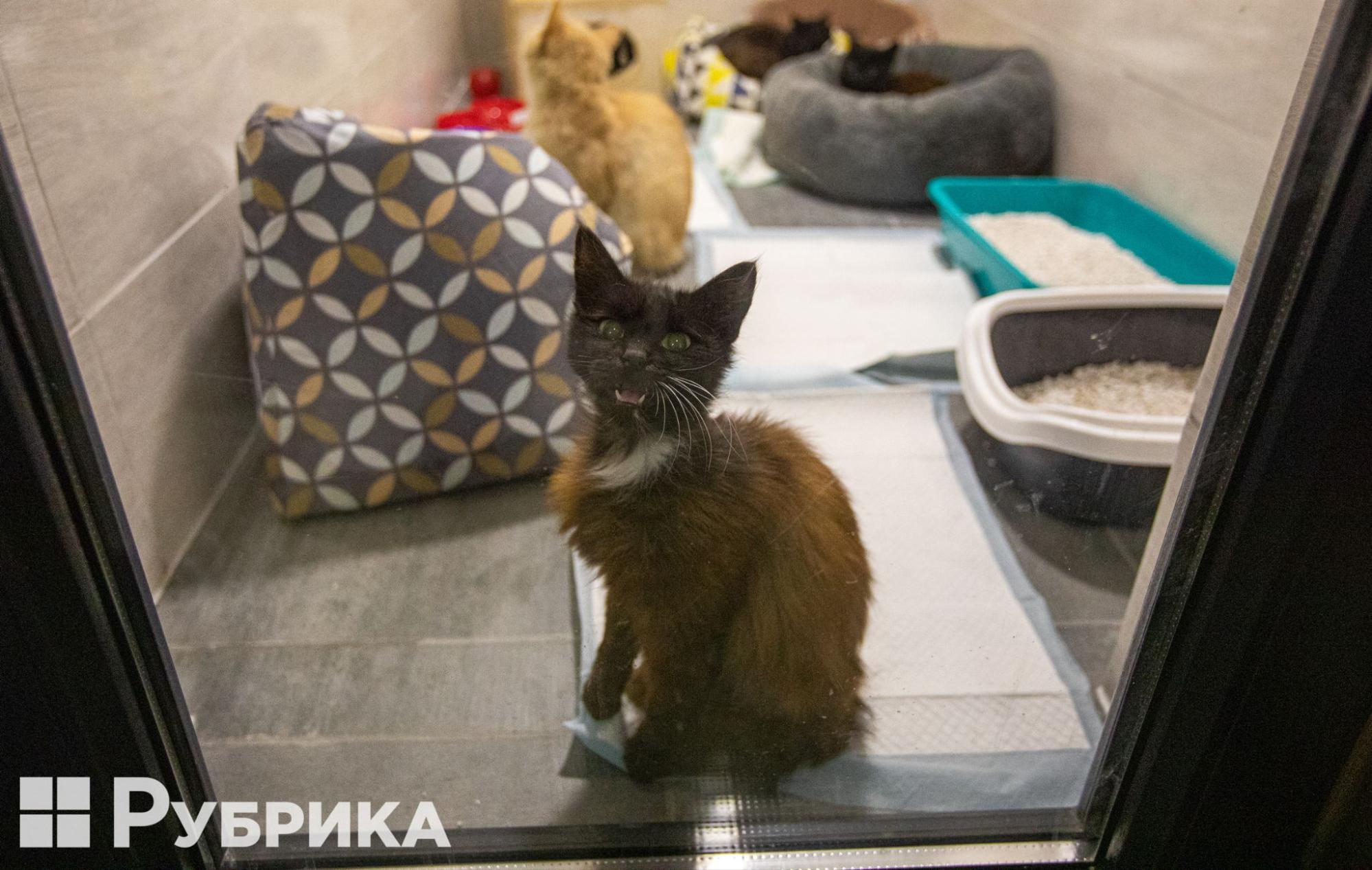
All rescued animals were provided their own beds, feed and the rest of the necessary stuff
The center will accommodate about half a thousand animals: about two hundred dogs and three hundred cats. The center representatives share that the enclosures have warm floors for the comfort of animals and airtight doors so that the animal cannot hear their neighbors, which is important for socialization and rehabilitation. Each box is equipped with ventilation so neither animals nor people feel excessive smells.
Each box is treated several times a day with disinfectant solutions so that the place is safe for the animal's health. This is the center's priority, says Podvoyska.
What are the actual needs?
Funds and people are needed
Patron Pet Center has already stopped taking food because they have an excess of it. This surplus will be distributed to other volunteers and shelters and taken closer to the front line, where this need is not covered.
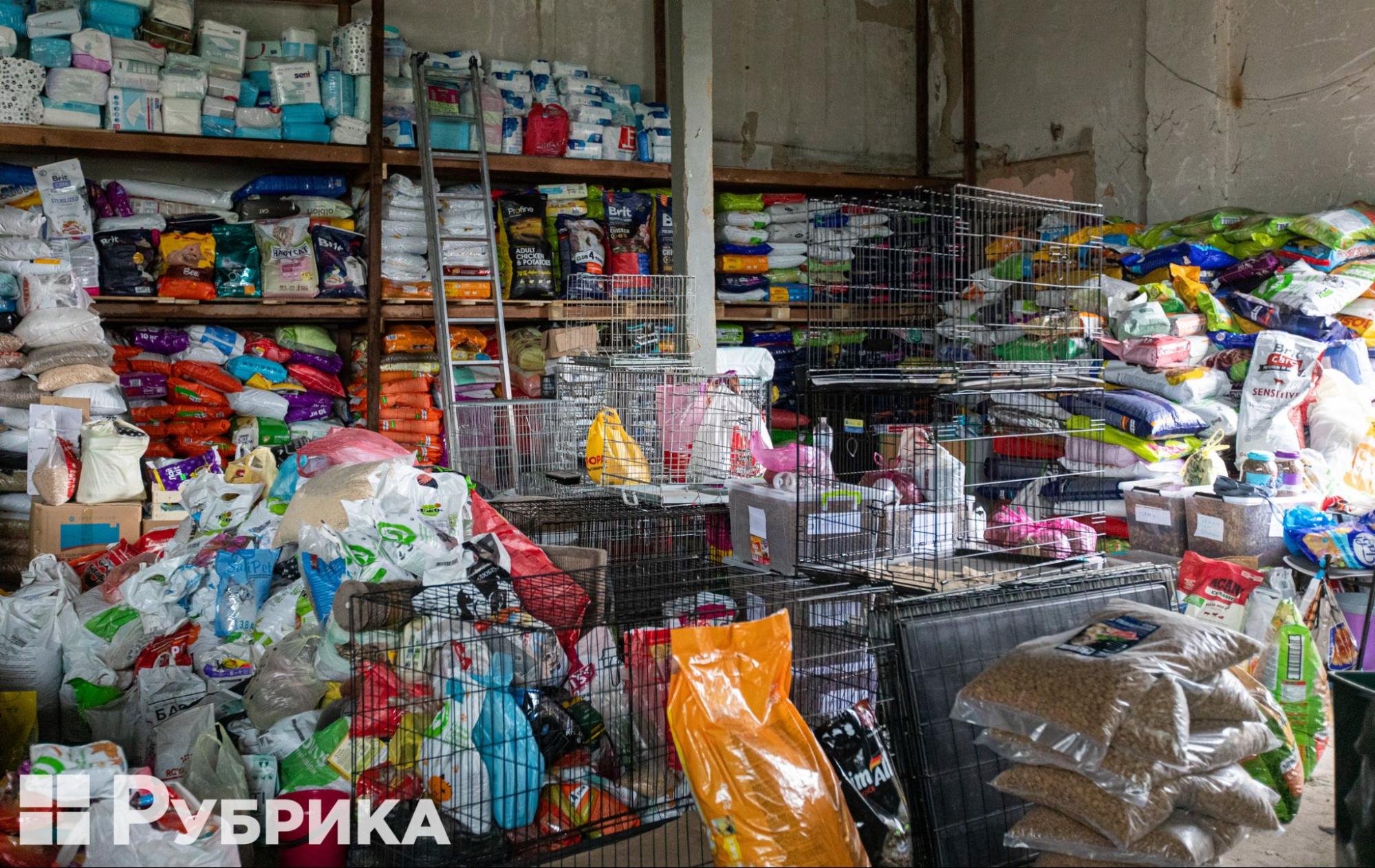
The center definitely no longer needs feed and related items. They will be shared with other volunteers and shelters
"Our people have woken up and understood that the responsibility for animals lies on human shoulders. It is we, the people, who must do everything in our power to make the life of these poor animals as comfortable as possible," says Pyatanchuk. However, many needs of the Center are still not covered.
All reliable information with current needs is posted on the Instagram page, says Podvoyska. She emphasizes that the center does not conduct joint fund-raising with anyone.
Funds are needed for the following:
- completion of construction of the center;
- equipment — such as industrial laundries, dishwashers, etc.;
- furniture;
- disinfectants.
- Help with animal care is also needed.
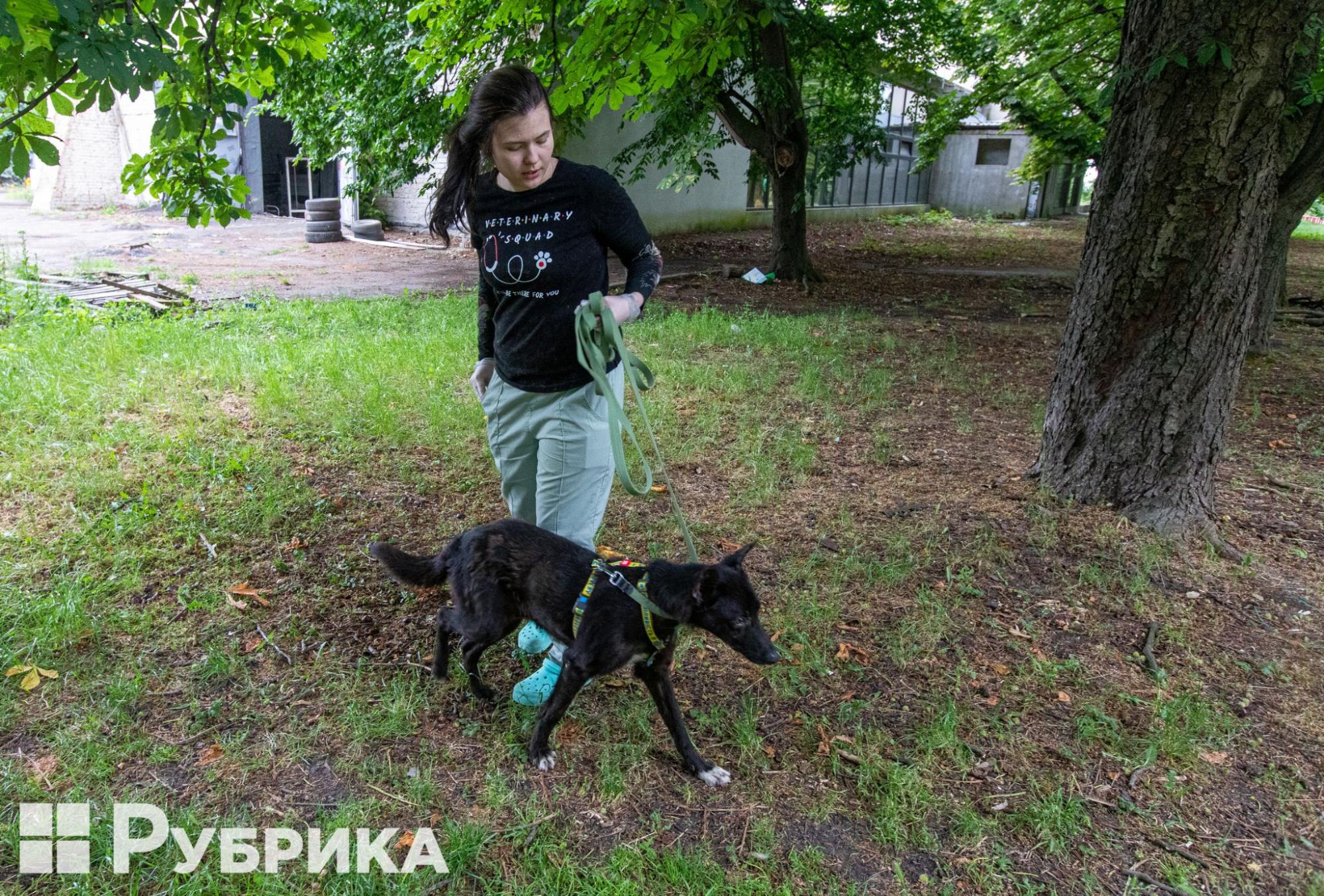
Volunteers do not refuse to help in walking animals but warn that you have to be very careful with stressed animals
"We need a lot of hands that are not afraid of dirty and unpleasant work," says Pyatanchuk. You should not be afraid of animals — nervous, sometimes aggressive, those under stress, and not used to walking on a leash. You must have the desire and ability to work with animals. Workers are most needed in the morning, from 8:00 a.m. to 10:00 a.m., and in the evening, from 6:00 p.m. to 8:00 p.m.
"Now we are supported by volunteers. We bow to them because it is simply invaluable. We all just sit down at night and sob. Both from the amount of work and the happiness that we are so united, we support each other. This is a beehive of love and kindness," shares the head of the center.
In the future, the center will need employees. They are waiting for those who are responsible, love animals, and understand how to work in a team.
Photo: Mykola Tymchenko


